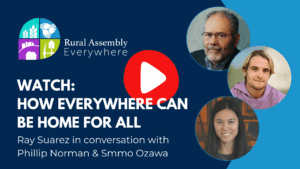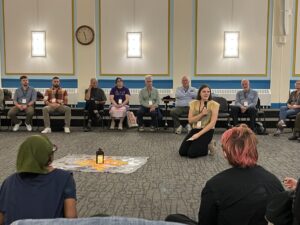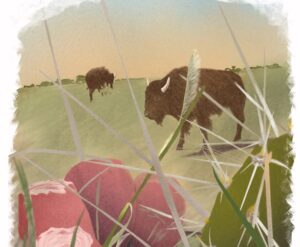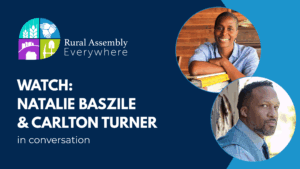Maus Book Controversy: Four Ways You Can Take Action
Plenty of people in East Tennessee are livid over a school board’s decision to remove “Maus” from the language arts curriculum. But indiscriminate outrage on TV and social media isn’t helping the local dissenters who are trying to build a better way forward, writes The Rural Assembly’s Whitney Kimball Coe today in The Daily Yonder. We are reprinting her column below, plus sharing four ways you can take action.
Commentary: Instead of Raging Over ‘Maus,’ Support Local People Who Are Fighting the Ban
By Whitney Kimball Coe
A few minutes before I gave an interview to CNN in response to the McMinn County School Board’s recent decision to ban Maus, I received this text from a friend: “Good luck. Remember, you live here.”
I understood exactly what he was saying. I’d been up most of the night organizing my thoughts, searching for a tone and a message that would communicate my outrage and preserve relationships with my neighbors and local leaders. I was about to go live on a global broadcast to denounce the actions of our local school board—because of course, they must be denounced—and yet, I needed those same leaders and their supporters to know that I wasn’t denouncing our community, that I wasn’t tapping out.
Just hours before, my phone was blowing up with screenshots and texts and emails from friends all over the country, asking about the book ban. McMinn County Schools was trending in second on Twitter, and Neil Gaiman retweeted the news and added that “there’s only one kind of people who would vote to ban Maus, whatever they are calling themselves these days.”
The Response in McMinn County
For most McMinn Countians, January 26 was the first time we’d heard of the called school board meeting that took place three weeks before. Locally, we were just learning the details of what happened as headlines were being written by major news networks across the world. It was bewildering to see how quickly the global response escalated and spread, and even in recent days, to see op-eds in the New York Times and other outlets underscoring the backwardness of Tennessee. Trevor Noah even curated a segment about the ban on The Daily Show.
Do they think we’re not outraged, too, here in East Tennessee? Do they think we can’t speak up and respond for ourselves? Because let me tell you, I lay awake the night before the CNN interview indulging my own outrage and constructing a commentary that would eviscerate all book ban supporters and signal to the rest of the world that I, too, am pissed off. It would feel good to give into the outrage, the indignation, the snark.
But I let the outrage pass over and through me because I live here. We live here. These are our people, our schools, our kids. We spend our days relying on the trust and goodwill of our neighbors to make a life here. Neil Gaiman doesn’t shop at the Food City downtown. Trevor Noah doesn’t volunteer with the local United Way. CNN isn’t interested in solutions journalism and outrage is where relationships go to die.
There’s no cure for opportunism. With each op-ed from another coastal publication, Tennessee becomes more alienated, and our public officials dig their heels in deeper. And those of us dissenting locally are left to bridge the gap, trying to figure out how to protect our hometown and organize for change.
As I lay awake, I remembered that the only side I’m on is the one that keeps the door open to a relationship, and one day, community transformation. When the rest of the world tires of tweeting, expounding and publishing op-eds about this ban, I’ll still be here: raising a family, living, working, organizing, and praying in a community that has my heart. I’ve got to be on the side of holding that together.
Bigger than McMinn County and Maus
The facts are these: the McMinn County School Board voted unanimously on January 10 to remove a Pulitzer Prize-winning work from the eighth-grade English Language Arts (ELA) curriculum about the Holocaust. The meeting minutes suggest that their objections to Art Spiegelman’s Maus series had less to do with the subject matter and more to do with a purity narrative that never seems to die, no matter the zip code. Communities that include major metro school systems in states across the country are banning books at an increasing rate and citing tired and troubled codes of decorum as justification.
The American Library Association says the number of attempts to ban school library books was 67% higher in September 2021 than in September 2020, fueled in large part by conservative activists organizing at a national level with an eye toward influencing local politics. This isn’t a McMinn County problem or a rural problem. We aren’t a novelty. We sure as hell shouldn’t be the scapegoats for deeper rifts in our national and global fabric.
If you must write about us, at least give a damn about us. Outrage is the quick and easy response if you’re not committed to the sum of us; that is, if you’re only committed to signaling which side you’re on and don’t really care about communities outside your bubble.
If you want to signal to the world that you’re on the side of solutions and repair, then write or tweet as a repairer of the breach.
Write about the donations that have poured into our local library these last days, both monetary and in the form of copies of the books! Look at the people who have been inspired to run for the school board. Talk about how one local parish is hosting a community-wide book discussion and conversation about the history of anti-Semitism in the Christian church. Celebrate Maus flying off bookshelves and selling out on Amazon. Find opportunities to deliver copies to kids in our community and around the world.
Leave the door open for a relationship so we can be transformed together.
Whitney Kimball Coe is a native of Athens in McMinn County, Tennessee, and is vice president of national programs for the Center for Rural Strategies, which publishes the Daily Yonder. She directs the Rural Assembly, a national coalition that supports better policy and more opportunity for rural Americans.
This column was published Feb. 1, 2022 on our media partner The Daily Yonder.
Four actions you can take
So what can you do? Channel your support into action at the local level, in McMinn County or your own rural community:
1. Support local community efforts by amplifying and celebrating them.
2. Donate to local organizations that are doing justice and equity work.
3. Share Maus with friends and family in your own community
4. Subscribe to the Rural Assembly’s Advocacy newsletter to stay up to date with ways you can advocate for these and other issues in our country.






